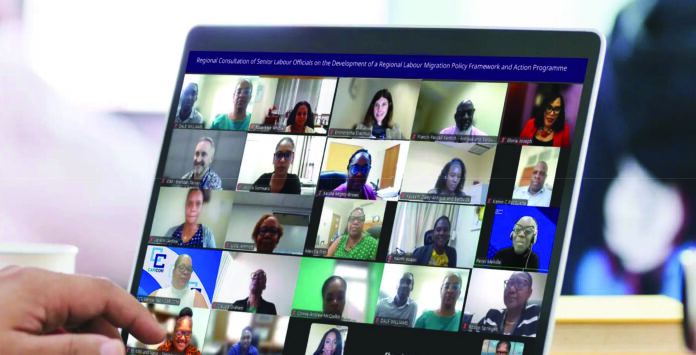Senior labour officials from CARICOM Member States met virtually on 29–30 July 2025 to advance a Regional Labour Migration Policy Framework supporting decent work, regional integration, and fair labour mobility.
PORT OF SPAIN, Trinidad and Tobago (ILO News) – The Caribbean is taking decisive steps toward a coordinated, people-centred approach to labour migration. During 29–30 July 2025, Senior Labour Officials from across CARICOM Member States joined representatives from the International Labour Organization (ILO) and the CARICOM Secretariat for a high-level virtual consultation aimed at shaping a Regional Labour Migration Policy Framework and Action Programme (RLMPF-AP).
The consultation built on momentum from an earlier bi-partite meeting of workers’ and employers’ organizations, held 14–15 July 2025 in Bridgetown, Barbados. That meeting, hosted by the ILO and CARICOM, brought together social partners to review the CARICOM Labour Market Analysis and discuss key challenges such as informality, skills gaps, and climate-related risks to jobs. Participants highlighted the urgent need for stronger labour market information systems, better skills recognition, and fair, transparent migration pathways. ILO Labour Migration Focal Point, Ms. Resel Melville, reminded participants that this work is anchored in a “whole-of-society” approach and backed by empirical evidence: “Empirically driven policy making is the practice we are seeking to embed. […] The consultations with social partners and now with you as senior officials ensure this framework is grounded in the realities of the region.”
Together, these engagements reflect an approach to designing policies that will strengthen decent work, deepen regional integration, and ensure that labour mobility benefits all Caribbean citizens.
Day one focused on assessing current conditions and frameworks, with updates on the CSME Free Movement agenda and a review of the draft CARICOM Migration Policy Framework. Expert presentations examined labour market characteristics, migration flows, and governance gaps, as presented in a draft report of recently concluded CARICOM labour market assessment. Mr. Abdelmalik Muhummed of the ILO underscored the urgency of coordinated action: “The Caribbean is at a pivotal moment in its labour market evolution […] By aligning migration governance with employment and skills strategies, the region can transform mobility into a force for inclusive growth, regional integration, and resilience.”
Day two shifted the discussion to the proposed objectives, structure and strategies for a regional labour migration policy framework and action plan, aligned to the five thematic pillars of the Latin America and Caribbean Labour Migration Strategy (2023–2030) (ILO):
Governance and policy coherence
Fair recruitment and access to employment
Improved working conditions
Mobility, training, and skills recognition
Social protection and social cohesion
As Ms. Melville outlined, “Form will follow function, if we have to address key challenges like informality, skills recognition, and exploitative recruitment, our framework must provide strategic, practical solutions that Member States can implement.”
Way forward and next steps
The closing session, facilitated by Ms. Wanya Illes, Deputy Programme Manager, Free Movement and Labour in the CSME Unit of the CARICOM Secretariat, presented a proposed timeline for developing the draft Labour Migration Policy Framework and Action Programme, which is expected to be finalized by 2026. The discussion also explored opportunities for ongoing technical support from the ILO and other development partners. Emphasizing the importance of sustained collaboration, Ms. Illes noted: “The value of this process is not just in producing a policy document, but in creating a shared vision and a practical roadmap that Member States can own, implement, and adapt to their evolving national contexts.”
The consultation concluded with a shared commitment that by 2026, a fully developed Regional Labour Migration Policy Framework and Action Programme will be ready for adoption, backed by technical support from the ILO and the CARICOM Secretariat. This collaborative effort represents more than a policy exercise, it is a statement of intent by the Caribbean to manage migration in a way that is fair, inclusive, and sustainable. When implemented, the Framework will not only enhance labour mobility and protect workers’ rights, but also position the region as a stronger, more cohesive economic and social community.




